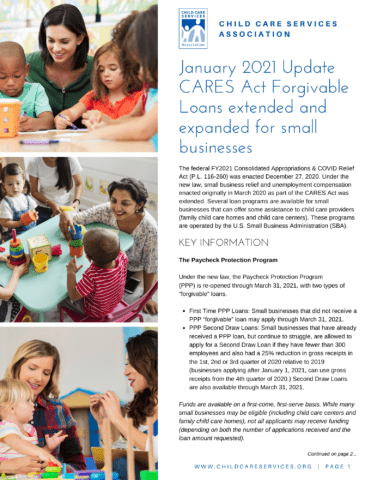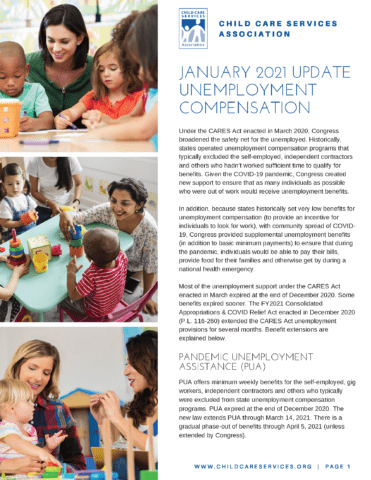Although COVID-19 is still within our communities and we need to continue to take precautions and practice social distancing, the good news is that effective vaccines are now being distributed throughout the state. Economic recovery has begun; however, unemployment is still high at 6.2% compared to 3.6% in January 2020.[i]
Child care is essential for parents to work and return to the workforce. Many child care programs are currently open. However, child care enrollment is low, which impacts the economic viability of operating a child care business.
The good news is that on December 27, 2020, a new federal law was enacted, the FY2021 Consolidated Appropriations and COVID Relief Act (P.L. 116-260).[ii] This new law provides many different types of support for working parents who depend on child care and also for child care programs who serve these families.
Child Care Funding
The new law includes a $10 billion increase in the child care funding that is allocated to states.[iii] North Carolina’s share of that funding is expected to be around $338.7 million.[iv] This money is on top of the regular federal funding for child care sent to states annually, which is about $310 million[v] for North Carolina (although an additional $118 million was allocated to North Carolina last March as part of the CARES Act).[vi]
There is broad flexibility for how the new child care funds can be spent. Funding decisions will be made in North Carolina by the NC Department of Health and Human Services’ Division of Child Development and Early Childhood Education (DCDEE) in the coming weeks.[vii] The purpose of the increased funding is to help support the child care market as well as working families who depend on child care.
Small Business Assistance

The Paycheck Protection Program (PPP) that was enacted as part of the CARES Act last March offered “forgivable” loans to small businesses. These loans equate to grants if spent for eligible purposes such as payroll and fixed costs. The new law re-opens the PPP “forgivable” loans to small businesses that are still struggling. In addition, for small businesses with fewer than 300 employees that have had a decline in revenue of 25% in any quarter in 2020 compared to 2019, the new law allows them to receive a second PPP loan to help address continued business challenges.
Both first and second PPP loans are available (first come, first served) through March 2021. Child care centers and family child care homes can apply for PPP relief. More details about the PPP program first and second loans are in our Child Care Services Association’s January 2021 Update CARES Act Forgivable Loans extended and expanded for small businesses briefing paper.
Emergency Economic Injury Disaster Loan (EIDL) Program (for loans and emergency cash advances) grants (up to $10,000) are extended under the new law through December 31, 2021. Small businesses that received an EIDL Advance grant previously and that are located in low-income communities are eligible to receive the difference between the amount they received under the CARES Act and $10,000 (i.e., the SBA issued many EIDL grants below $10,000 in order to support more small businesses and the new law seeks to ensure that the full $10,000 advance is available). More details about the EIDL advance provisions are in Child Care Services Association’s January 2021 Update CARES Act Forgivable Loans extended and expanded for small businesses briefing paper.
Early Childhood Training and Technical Assistance also have webinars for child care providers which offer an overview of the business resources in the Coronavirus Response and Relief Supplemental Appropriations Act, 2021 (CRRSA). Learn more here.

Unemployment Assistance
The new law also extends unemployment assistance. The Pandemic Unemployment Assistance (PUA) program that Congress created through the CARES Act in March 2020 to offer a safety net for individuals typically excluded from state unemployment programs (such as the self-employed, like family child care home providers, gig workers, independent contractors and others) is extended through March 14, 2021, with a phase-out through April 5 (unless extended by Congress).
The Federal Pandemic Unemployment Compensation (FPUC) program, which had provided a $600 weekly supplemental unemployment payment to those individuals receiving state or federal unemployment benefits expired on July 31, 2020. The new law reinstates the weekly supplement at $300 per week through March 14, 2021. More details about the unemployment provisions are in the CCSA January 2021 Update Unemployment Compensation briefing paper.
Economic Impact Payments
Taxpayers with social security numbers should start to receive economic impact payments soon if they have not received them already. The new law provided a second round of economic impact payments, or “EIP 2,” of $600 for individuals and $1,200 for married couples filing a joint return. In addition, families with children under age 17 will also receive $600 for each child.
Qualifying families must have adjusted gross income up to $75,000 for individuals and up to $150,000 for married couples filing joint returns. More information is available on the IRS website. These payments should be made automatically (i.e., no need to apply), but families can use the Get My Payment tool, available in English and Spanish on IRS.gov.
Housing Assistance
The new law also provides $25 billion to state and local governments to increase emergency rental assistance. Eligible renters must have household income of 80% of area median income or less, must be able to demonstrate housing instability (e.g., be behind on rent payments) and one or more household members who qualify for unemployment benefits. Households with income of 50% of median income or less receive priority. A summary by the U.S. House of Representatives Financial Services Committee of the rental assistance provided under the new law is located here.
2020 was a long year for everyone. As we enter 2021, it’s important to look for ways to support each other—families, businesses and communities. We can get through this unprecedented time, but only by uniting to support each other. We are all in this together. Peace, health and happiness in the new year.
[i] U.S. Bureau of Labor Statistics, North Carolina Unemployment Rates at a Glance.
[ii] FY2021 Consolidated Appropriations and COVID Relief Act, P.L. 116-260.
[iii] Ibid.
[iv] Center for Law and Social Policy (CLASP), Child Care Relief Funding in the Year-End Stimulus Deal: A State-by-State Estimate.
[v] U.S. Department of Health and Human Services, Office of Child Care, FY2020 Child Care Funding.
[vi] Ibid.
[vii] NC Department of Health and Human Services, Division of Child Development and Early Childhood Education.




